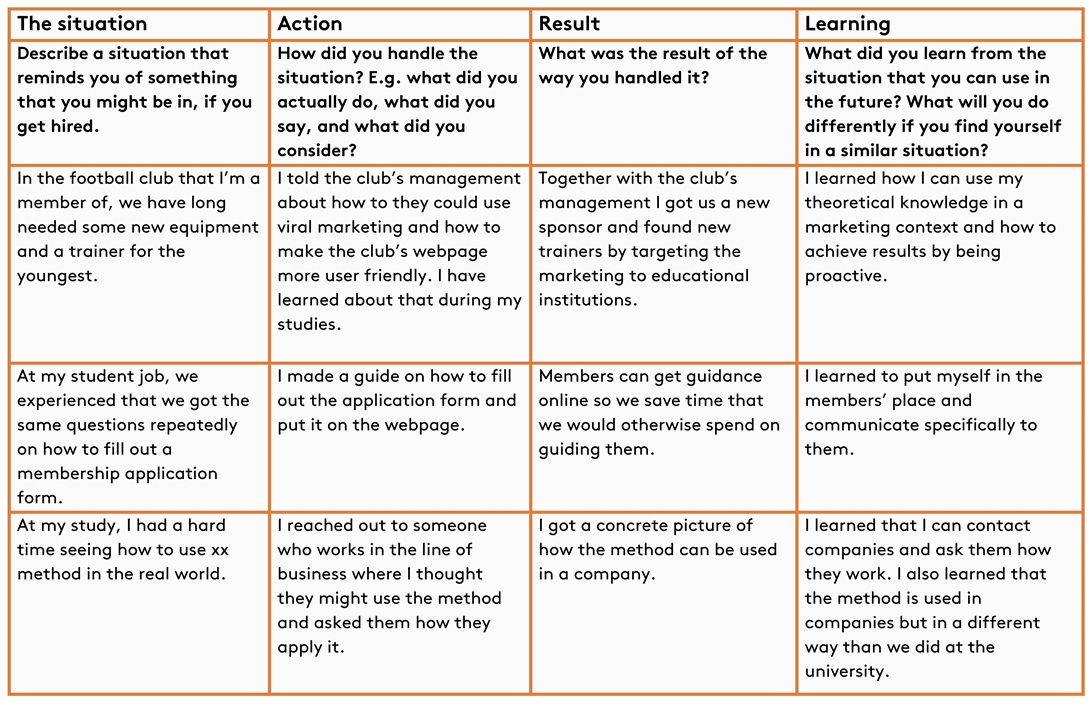1. Figure out the logistics and get off to a good start
Get control of the basic but important things:
- Where should interview take place?
- When is the interview?
- How do I get there?
- What am I going to wear?
Having the basics covered will let you use your energy on more important things, like the next steps.
2. Support your CV and application with concrete examples
Find concrete examples of skills you have mentioned in your CV or application. If you say that you are proactive or flexible, think about specific situations where you actually showed those skills. I'm sure you can think of some examples.
3. Research, research, research
The employer may have already looked you up on Google, Facebook or LinkedIn. So, make sure you're just as prepared.
Google is your friend. Explore the company’s website, their LinkedIn or research how they have been promoted in the media. Also find out who's participating in the interview.
Do you have a mutual acquaintance? Use that to your advantage? Ask them all the questions you might not be able to find the answers to eslewhere.
4. Prepare a short presentation
The most common first question in Danish interviews is, "Tell us about yourself." Do you know what you're going to answer to that? You might as well prepare for it. Prepare a brief and concise presentation of yourself, and, above all, relate it to the position.
Also, use it as an opportunity to steer the interview in a direction you want to go.
 Obviously, you shouldn't take over the entire interview. Studies show that about 1 minute is appropriate to answer the question, so aim for that. This is about 130 words at normal talking speed, if you're into things like that. Otherwise, remember to practice at home.
Obviously, you shouldn't take over the entire interview. Studies show that about 1 minute is appropriate to answer the question, so aim for that. This is about 130 words at normal talking speed, if you're into things like that. Otherwise, remember to practice at home.
Start with anwering these questions when you prepare:
- Who are you?
- What is your educational background?
- What work experience do you have?
- How would you characterize yourself?
- What value will you add to the company - what difference will you make?
- Why should they choose you?
5. Prepare your questions
Prepare some questions for the company. Think about what is important for you to know to find out if you match the position. Also, think about how your questions say something about you – let them reflect your professionalism and motivation.
Examples of professional questions:
- Questions for the tasks
- What are your expectations of me?
- What are my success criteria?
- What are the goals of my job?
- What does it take for me to succeed in this job?
- What are the goals for the business area I will work in at your company?
- What competences are already covered in the team? And where can I contribute?
- Do you work in teams or how are tasks accomplished in the department?
- What challenges are there in working in a company like yours?
- Who is my manager? And what management model does my manager use?
- Why is this position vacant (is it a newly created position)?
6. Prepare your answers
Prepare answers to the questions you expect to get, but also the ones you do not want at all. It varies from person to person, but typical feared topics are strengths, weaknesses, expected salary, and children. Write down answers in keywords and bring them to the interview.
Typical questions at a job interview:
- What do you know about our company/department?
- What are your strengths/weaknesses?
- What assignments do you particularly like?
- What assignments are you less happy about?
- What would your manager in xxx say about you?
- What results are you particularly proud of?
- What are you like as a colleague?
- What are your expectations for your manager?
- What can stress you?
- How do you react under pressure?
- Where will you be in 3-5 years?
- What are your expectations in regard to salary?
- Do you have a family?
- Why should we hire you?
- Is there something important we have not asked about?
The way you approach the critical questions says something about you and can influence whether you get the job. Think about whether you are on the defense or offense.
 Stick to the facts, keep your stories short and sweet, and leave it at that. Focus on your own learning. The interview might not go the way you expected, but learn from it and use that for the next interview.
Stick to the facts, keep your stories short and sweet, and leave it at that. Focus on your own learning. The interview might not go the way you expected, but learn from it and use that for the next interview.
Here's an example of how you can prepare:

7. Bring your job interview package
Always bring the job posting, CV, application and your keywords/notes to the interview. It gives the impression that you are prepared.
If you have references, you can write them on a piece of paper that you can hand over. It could say: Contact information, title, and perhaps a description of the relation to you and when he/she can be reached.